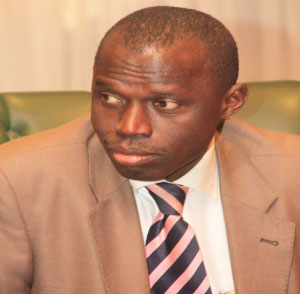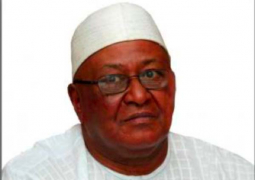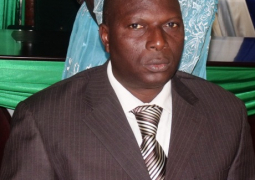
Mr. Kolley, whose ministry is responsible for labour, delivered a statement at July 22nd Square in Banjul yesterday, on May Day (1st of May each year) observed as a public holiday in The Gambia. The theme for this year’s event is: “Tackle Employment Challenges through Social Dialogue”.
The Gambia government, minister Kolley told workers assembled at the square, “recognizes that the country’s most critical resource is its people, who are not only the drivers of its development, but also at the pinnacle of its development agenda.
“Therefore, the government will tackle head on anything that threatens to constrain the providers of labour to occupy their rightful position in the country’s development process, as they are the bedrock of its very existence.”
“It is in this regard that the government continues to allocate resources to human capital formation to enable the availability of a healthy and skilled labour force to industries, as well as enhancement of employability and employment, both in the formal and informal sectors of the economy.”
The Labour minister went on to announce that his ministry in collaboration with the Gambia Investment and Export Promotion Agency, GIEPA, “embarked on a process to review the Labour Act 2007 to address emerging issues and ensure an investor-friendly business environment.”
“In this review process, government will pay particular attention to the plight of the workers without whom realizing the PAGE (the country’s programme for accelerated growth and employment) objectives will be seriously constrained, especially if the atmosphere for labour relations are inimical to investment.
“I therefore call on all tripartite members to actively participate in the review process, so we can have labour laws that are unambiguous, balanced and address the needs of all concerned parties.”
Minister Kolley added that “the enhancement of employability and employment of labour is a collective enterprise in which we all have a critical role to play.
“It should be noted that availability of abundant healthy, skilled labour to industries can only contribute significantly to the country’s socio-economic prowess if it is disciplined in respect of universally accepted work ethics, professionalism and amenability to negotiation when aggrieved on account of bad working conditions and unattractive remuneration.
“A disciplined work force is a potent ‘pull factor’ with respect to foreign direct investment, which the country must continue to lure to spur its industrialization and integration into the global economy”, he went on.
“As I stated at the Labour Act review seminar last month and I repeat here, employers must also play their part in the search for good labour relations.
“They must understand that workers, being an integral part of their production processes, need recognition, respect, and opportunities for career development. Accordingly, employers should make themselves readily available to workers for consultation, negotiation, and discussion of mutually beneficial matters.
“They should ensure that workers are commensurately rewarded for their effort, and are always assured of a healthy and safe work environment."
He continued: “It is common knowledge that investment, both domestic and foreign, is needed for wealth and employment creation necessary for poverty reduction. Employment will not be created on the scale needed if investors perceive that poor labour relations will dim their prospects of generating desired returns.
“Under such circumstances, dialogue and not industrial action, is a primary option for redress. Dialogue, involving the tripartite constituents (the government, employers and workers) substantially helps in reaching an amicable resolution of industrial disputes, if it is underpinned by good faith, work ethics, and professionalism.
“In summary, social dialogue should be the hallmark of our industrial relations, in a truly tripartite environment.
“To conclude, and as we celebrate May Day today, let us renew our collective resolve to work together for a better work environment underpinned by improved labour laws for increased investment, growth and poverty reduction.
“In an environment where the government provides the appropriate legal framework; the workers adhere to good work ethics, discipline and professionalism; and employers ensure safety at work and adequate remuneration, we will all prosper and achieve the objectives we have set for ourselves”
Ebrima Garba Cham secretary-general of the Gambia trade union congress, GNTUC, in his statement delivered to mark May Day 2014, reminded all that, in past centuries, “little or no attention was paid to workers’ welfare”.
“May Day is a time for renewal and reaffirmation of our adherence to the principles enshrined in the international accords and protocols signed purposely to focus attention on the plight and welfare of workers throughout the world,” Garba Cham noted.
Cham pointed out that countries all over the world have come a long way in addressing issues relating to workers’ welfare.
“We must remain vigilant in guarding against the re-occurrence of poor and unacceptable work conditions…We must also strive to improve upon our gains, and seek a more holistic pattern of development that attaches priority to worker welfare, dignity and respect in promoting fundamental rights and freedom at the work place”.
Cham went on to further note that, in today’s world “we are faced with new socio-economic transformations that require continued attention on issues of importance to workers’ welfare.
May Day celebration is, therefore, relevant today as it was in 1919 when it was first promulgated. This day provides the occasion for all workers to renew their dedication to productive engagement in conditions of justice and dignity for all, and in an atmosphere of peace and harmony.
“We at the union headquarters are in constant dialogue with the government of The Gambia, the ILO and other stakeholders. They are all concerned and committed to ensuring that better living conditions and decent work standards for workers and their families is maintained.
“It is against this backdrop that the ‘decent work country programme’ is embarked upon to create jobs and to promote opportunities for Gambians to engage in dignified productive work. All hands are on deck, and we are all poised to see that the rights and privileges of workers are jealously guarded in this country.”
May Day Sports is always a part of Workers’ Day celebration in The Gambia, and the minister of Youth and Sports, Alieu Jammeh, also attended and delivered a statement at the square, in which he declared that May Day Sports will henceforth become a permanent program under the National Sports Council.
This year’s May Day Sports has attracted the participation of 64 organisations, from both the public and private sectors.
Declaring that it is significant in the drive to have mass participation in sports for human well-being, minister Jammeh added that in The Gambia, it has added ingredients for the celebrators in the form of socialization and networking through sports. It also strengthens the relationship between the government and the private sector, he pointed out.
The Sports minister noted that the 2014 edition of the May Day Sports is, for the first time, being organized by the ministry of Youth and Sports through the National Sports Council.
“I have no doubt that the event has become a permanent program under the National Sports Council,” he announced.
Read Other Articles In Article (Archive)
Theft From the State is theft From us All
Aug 13, 2008, 5:08 AM




